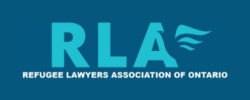The Refugee Lawyers Association (RLA) is dismayed that the Immigration and Refugee Board may be limiting the disclosure of Refugee Claimants by imposing maximum page numbers for country documents. Furthermore, the RLA is concerned about Board Members being issued any directive to strictly enforce the ten-day deadline in respect of disclosure and other matters. The RLA strongly opposes these restrictions.
Page Number Restrictions
The Refugee Protection Division Rules, SOR/2012-256 (the “Rules”) do not impose limitations on the number of pages disclosed by Refugee Claimants. Such a limitation would be contrary to:
a. principles of natural justice;
b. section 7 of the Canadian Charter of Rights and Freedoms (the “Charter”);
c. the Immigration and Refugee Protection Act, RSC 2001, c 27 (the “IRPA”); and
d. Canada’s international law obligations.
The Supreme Court of Canada has held that “the rule of autonomy in administrative procedure and evidence, widely accepted in administrative law, has never had the effect of limiting the obligation on administrative tribunals to observe the requirements of natural justice”.1 Furthermore,
…the major decisions which formulated the principle of the independence of administrative evidence from technical rules have in the same breath made it clear that this independence must be exercised in accordance with the rules of fundamental justice. It is not sufficient for administrative tribunals to operate simply and effectively: they must attain this high ideal without sacrificing the fundamental rights of the parties.2
Thus, administrative tribunals are required to both observe principles of natural justice and to take into consideration the fundamental rights of the parties.
These fundamental rights include a fair procedure that is mandated by section 7 of the Charter, as recognized by the Supreme Court over thirty years ago.3 Furthermore, imposing arbitrary limitations on disclosure violates Canada’s international law obligations. In the decision of Huseen v. Canada (Minister of Citizenship and Immigration), [2015] F.C.J. No. 956, 2015 FC 845, Justice Diner emphasized that a restrictive interpretation of the Rules (in those circumstances, it was in respect of a reopening application), undermines Canada’s commitment to refugee protection.
In my view, the door should not slam shut on all those who fail to meet ordinary procedural requirements. Such a restrictive reading would undermine Canada’s commitment to its refugee system and underlying international obligations (section 3(2) of the Act). Indeed, one of the purposes of the Refuge Convention, to which Canada is a signatory, is to allow refugees the widest possible exercise of fundamental rights and freedoms (Febles v Canada (Citizenship and Immigration), 2014 SCC 68 at para 27).
Country documents are required to fully present a Claimant’s case. The National Documentation Package (NDP) provided by the IRB is often outdated and/or incomplete. For example, after the attempted coup in Turkey on July 15, 2016, there was a delay of approximately six months before the NDP was updated to detail the persecution that ensued thereafter. Furthermore, even where the NDP for a country is updated every few months, it may be biased towards a position (depending on the sources replicated), and/or silent in respect of certain groups and beliefs within the country. As a result, the right to fairly present the objective basis of a Claimant’s fear must be prioritized over the Board’s interest in adjudicating refugee claims with “efficiency”.
Furthermore, it is unclear why Board Members are unable to efficiently review country document disclosure. Most refugee claims are funded by Legal Aid Ontario. The preparation of a refugee claim for a hearing (after the process of drafting the Basis of Claim), is limited to nine hours. Research (finding and reviewing country documents) is often undertaken by counsel within this nine hours, as is client preparation, review of personal documents, legal research, and correspondence. It is therefore unreasonable for the IRB to claim that the review of country conditions takes so long that maximum page numbers are required, when counsel are mandated to research and review the country documents within a very short period of time.
The Ten-Day Rule
Within several provisions of the Rules, there is a ten-day deadline for documentary disclosure, applications, the proffering of witnesses, and amendments to a Claimant’s Basis of Claim form. However, the Board Member has discretion to accept additional documents/applications/witnesses/changes after the ten day-deadline upon undertaking an analysis of factors and the context for the delay. This discretion is mandated due to the same issues set out above (natural justice, the Charter, the IRPA, and international law obligations).
Furthermore, this discretion is required by the Interpretation Act, R.S.C., 1985, c. I-21, which dictates the following at section 12 (the “Interpretation Act”):
Every enactment is deemed remedial, and shall be given such fair, large and liberal construction and interpretation as best ensures the attainment of its objects.
Mandating that Board Members take a “stricter” approach to the ten-day requirement is contrary to the Interpretation Act. The IRPA, its regulations, and the Rules are remedial. The remedy is to provide safety for individuals who are fleeing persecution. The prejudice (if any) to the efficiency of the administration of justice in having a Board Member take a short break (if required) to review a few extra pages is far outweighed by the prejudice to a Claimant in not being able to fully present 3 his/her case. As such, the IRB’s direction amounts to an impermissible fettering of the discretion of Board Members.
Conclusion
The RLA understands that the IRB has a backlog of claims. However, the backlog does not justify new administrative policies that deprive an individual fleeing persecution of a fair hearing guaranteed by Canadian and international law. Efficiencies should be found elsewhere – in respect of issues that do not adversely impact the hearings of Claimants.
___________________________________________________________________
1 Université du Québec à Trois-Rivières v. Larocque, [1993] 1 SCR 471, 1993 CanLII 162 [pinpoints unavailable], online: http://canlii.ca/t/1fs4l
2 Ibid.
3 Singh v. Minister of Employment and Immigration, [1985] 1 S.C.R. 177. 2
